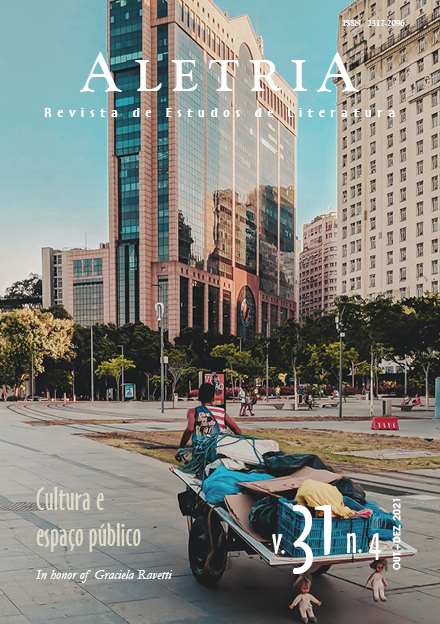Palladius’ Carmen de Insitione as Rewriting of the Latin Agronomical Tradition
DOI:
https://doi.org/10.35699/2317-2096.2021.35387Keywords:
tradition, rewriting, technical literature, Palladius, poetryAbstract
In this article, our aim is to discuss how Palladius (4-5th centuries A.D.) rewrites the agronomical tradition of Latin Literature. As we discuss below, this firstly occurs in the sense that, in Book XV of his Opus agriculturae, he makes efforts to assign poetical features to the topic of arboreal grafting, similarly to what Virgil had done in Georgics II, 69-82. Secondly, when he attaches the same Book – mainly written with the resource of elegiac couplets – to a technical treatise in prose, Palladius reproduces procedures which were before followed by Columella (1st century A.D.), in the context of his De re rustica. Nevertheless, always making changes and rearrangements in accordance with his own choices, the author of Opus agriculturae renews the old writing tradition in which he takes part.
Downloads
References
ANDREAU, Jean. L’économie du monde romain. Paris: Ellipses, 2010.
ARMENDÁRIZ, José Ignacio García. Agronomía y tradición clásica: Columela en España. Sevilla: Universidad de Sevilla: Universidad de Cádiz, 1995.
CAIRNS, Francis. The Aeneid as Odyssey. In: CAIRNS, Francis. Virgil’s Augustan Epic. Cambridge: Cambridge University Press, 1989. p. 177-214. DOI: https://doi.org/10.1017/CBO9780511597336.009.
CARTELLE, Enrique Montero. Prosa técnica no gramatical. In: CODOÑER, Carmen. (org.). Historia de la literatura latina. Madrid: Cátedra, 2007. p. 795-810.
CATON; VARRON; COLLUMELE; PALLADIUS. Les agronomes latins. Avec la traduction en français, publiés sous la direction de M. Nisard. Paris: Garnier Frères, 1851.
CATULO. O livro de Catulo. Trad., introdução e notas de João Angelo Oliva Neto. São Paulo: Edusp, 1996.
COLUMELLA. On Agriculture X-XII: On Trees. With an English translation by E. S. Forster and Edward H. Heffner. London: Harvard University Press, 1968.
FITCH, John G. Introduction. In: PALLADIUS. The Work of Farming (Opus Agriculturae). A new translation from the Latin by J. G. Fitch. Devon: Prospect Books, 2013.
HORACE. The Odes and Carmen Saeculare of Horace. Translated by John Conington. London: George Bell & Sons, 1882.
HORNBLOWER, Simon; SPAWFORTH, Antony (org.). The Oxford Classical Dictionary. Oxford: Oxford University Press, 2012. DOI: https://doi.org/10.1093/acref/9780199545568.001.0001.
LOWE, Dunstan. The Symbolic Value of Grafting in Ancient Rome. Transactions of the American Philological Association, Baltimore, v. 140, n. 2, p. 461-488, Autumn 2010.
OVÍDIO. Metamorfoses. Org. de Mauri Furlan e Zilma Gesser Nunes. Florianópolis: Editora UFSC, 2017.
PALLADIUS. Das Bauernjahr. Herausgegeben und übersetzt von Kai Brodersen. Berlin: Walter de Gruyter, 2016. DOI: https://doi.org/10.1515/9783110432138.
PALLADIUS. The Work of Farming (Opus Agriculturae). A new translation from the Latin by J. G. Fitch. Devon: Prospect Books, 2013.
PALMER, Leonard R. The Latin Language. Norman: University of Oklahoma Press, 1988.
PERNOT, Laurent. La Rhétorique dans l’Antiquité. Paris: Le Livre de Poche, 2000.
PREMINGER, Alex; HARDISON, O. B.; WARNKE, Frank J. (org.). Encyclopedia of Poetry and Poetics. Princeton: Princeton University Press, 1987.
REBOUL, Olivier. Introdução à retórica. Trad. de Ivone Castilho Benedetti. São Paulo: Martins Fontes, 2004.
ROBY, Courtney. Latin Didactic, Scientific, and Technical Literature. In: OXFORD Handbooks online. Oxford: Oxford University Press, 2015, p. 1-23. DOI: https://doi.org/10.1093/oxfordhb/9780199935390.013.100. Disponível em: https://www.oxfordhandbooks.com/view/10.1093/oxfordhb/9780199935390.001.0001/oxfordhb-9780199935390-e-100. Acesso em: 03 jul. 2021.
SANTOS, Gilson José dos. Literatura agrária latina: tradução e estudo do De Re Rustica (livro IX) de Columela, e Geórgicas (canto IV), de Virgílio. Orientador: Matheus Trevizam. 2014. 184 f. Dissertação (Mestrado em Estudos Literários) – Faculdade de Letras da Universidade Federal de Minas Gerais, Belo Horizonte, 2014.
SILKE, Diederich. Das römische Agrarhandbuch as Medium der Selbstdarstellung. In: FÖGEN, Thorsten (org.). Antike Fachtexte: Ancient Technical Texts. Berlin: Walter de Gruyter, 2005, p. 271-288.
THOMAS, Richard Fitzgerald. Introduction. In: VIRGIL. Georgics, volume I: Books 1-2. Edited by Richard F. Thomas. Cambridge: Cambridge University Press, 1994, p. 1-34.
THOMAS, Richard Fitzgerald. Prose into poetry: tradition and meaning in Virgil's “Georgics”. Harvard Studies in Classical Philology, Cambridge, v. XCI, p. 229-260, 1987. DOI: https://doi.org/10.2307/311407.
VANSAN, Jaqueline. Poética e retórica nas Heroides de Ovídio: uma análise da Epístola I, de Penélope a Ulisses. Orientador: João Batista Toledo Prado. 2016. 167 f. Dissertação (Mestrado em Estudos Literários) – Faculdade de Ciências e Letras da Universidade Estadual Paulista, Araraquara, 2016.
VIRGILE. Géorgiques. Texte établi et traduit par E. de Saint-Denis. Paris: Les Belles Lettres, 1998.
WHITE, K. D. Roman farming. London: Thames & Hudson, 1970.
Downloads
Published
How to Cite
Issue
Section
License
Copyright (c) 2021 Matheus Trevizam (Autor)

This work is licensed under a Creative Commons Attribution 4.0 International License.
Authors who publish with this journal agree to the following terms:Authors retain copyright and grant the journal right of first publication with the work simultaneously licensed under a Creative Commons Attribution Non-Commercial No Derivatives License that allows others to share the work with an acknowledgement of the work's authorship and initial publication in this journal.Authors are able to enter into separate, additional contractual arrangements for the non-exclusive distribution of the journal's published version of the work (e.g., post it to an institutional repository or publish it in a book), with an acknowledgement of its initial publication in this journal.Authors are permitted and encouraged to post their work online (e.g., in institutional repositories or on their website) prior to and during the submission process, as it can lead to productive exchanges, as well as earlier and greater citation of published work (See The Effect of Open Access).





